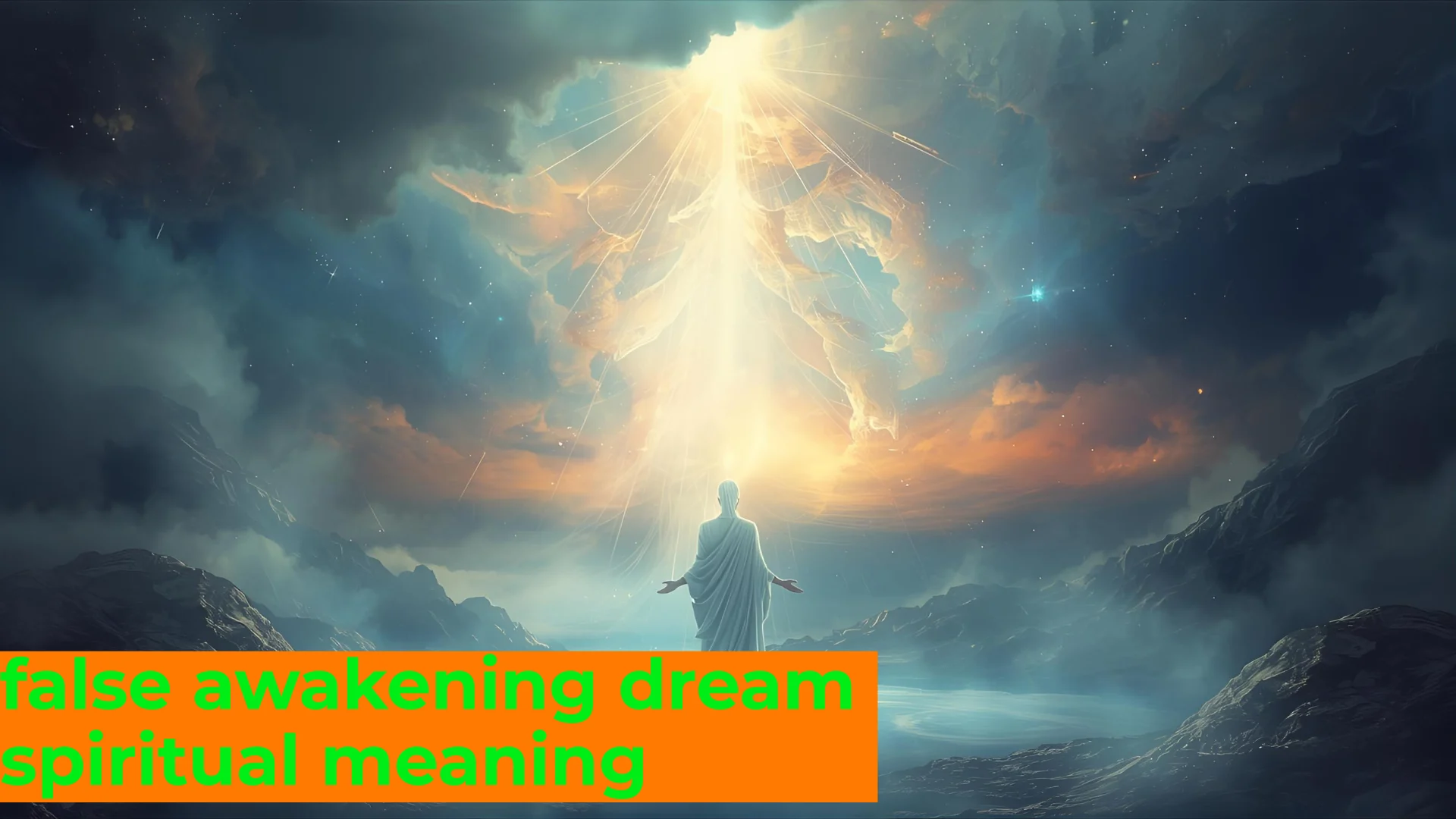Have you ever “woken up,” started your morning routine, only to realize—suddenly—that you were still dreaming? This unsettling experience is known as a false awakening dream, and it has captivated dreamers, spiritual seekers, and psychologists for centuries.
I remember the first time I experienced one. I thought I had risen from bed, poured coffee, and prepared for work. Everything felt normal—until the walls of my kitchen began to melt. In that moment, I “woke up” again, this time in my actual bed, my heart racing. It felt like I had slipped between dimensions, caught between the waking world and the dream realm.
False awakenings often feel more vivid than regular dreams. They leave us questioning the nature of reality, the layers of consciousness, and even the boundaries between the physical and spiritual world. But what do these dreams mean? Are they just psychological tricks of the mind, or do they carry spiritual messages meant for us?
Let’s dive deep into the spiritual meaning of false awakening dreams, exploring history, psychology, symbolism, and personal transformation.
📜 Historical & Anthropological Background
False awakening dreams are not new—they’ve been recorded across cultures and time periods.
- Ancient Greece & Rome 🏛️ – Philosophers like Aristotle speculated about layered dreaming and whether waking life itself could be another dream.
- Eastern Traditions 🌏 – In Tibetan Buddhism, the practice of dream yoga teaches that dreams can be doorways to enlightenment. A false awakening was seen as a reminder that reality itself is an illusion (Maya).
- Shamanic Traditions 🌿 – Indigenous cultures often treated false awakenings as moments when the spirit temporarily steps outside the body. Such dreams were used as signs to consult healers or spiritual guides.
- Medieval Europe ⛪ – False awakenings were sometimes linked to demonic interference, sleep paralysis, or omens of major life changes.
Anthropologically, false awakenings reveal humanity’s timeless curiosity about where dreams end and reality begins. They blur the line between everyday life and mystical experience, making them deeply symbolic across cultures.
🧠 Psychological & Healing Interpretations
From a modern perspective, psychology offers insightful explanations for false awakening dreams.
- Sigmund Freud believed dreams were tied to unconscious desires and anxieties. A false awakening, therefore, might reflect suppressed stress or fear about daily responsibilities.
- Carl Jung saw dreams as messages from the unconscious and the collective unconscious. A false awakening could symbolize the psyche urging us to wake up to a deeper truth in our lives.
- Modern Neuroscience suggests that false awakenings occur during REM sleep, when the brain is highly active. It simulates familiar environments (like your bedroom) before fully waking, creating the illusion of being awake.
Healing Perspective 🌱
False awakenings often appear during periods of:
- High stress or anxiety (the brain rehearses waking routines).
- Deep personal transformation (symbolizing readiness for inner awakening).
- Trauma recovery (the psyche struggles between facing reality and retreating into safety).
Instead of fearing them, many therapists suggest treating false awakenings as opportunities for self-reflection, asking:
- What part of my life am I ignoring?
- Where am I not truly awake to my own truth?
🌌 Spiritual & Religious Perspectives
False awakenings are rich in spiritual symbolism across traditions:
- Native Traditions 🌿 – Often seen as visions reminding the dreamer to remain connected to the spirit world. They may symbolize the ancestors attempting to deliver a message.
- Hinduism & Buddhism 🕉️ – Both traditions connect false awakenings to the concept of Maya (illusion). The dream is a metaphor urging us to see that waking life, too, is a kind of dream.
- Christian Mysticism ✝️ – Some mystics viewed false awakenings as moments of spiritual testing, symbolizing vigilance and readiness for divine truth.
- New Age Spirituality 🌠 – Many see false awakenings as portals, where the soul slips between dimensions. They may signal that one is developing spiritual gifts like lucid dreaming, astral travel, or heightened intuition.
🪶 Deeper Symbolism of False Awakening Dreams
These dreams carry profound symbolic messages:
- Awakening to Inner Truth 🌟 – You’re being nudged to recognize areas where you’re living on “autopilot.”
- Strength & Resilience 💪 – Repeated false awakenings may symbolize endurance in facing cycles of challenge and growth.
- Protection 🛡️ – They may act as warnings or safe simulations to prepare you for future challenges.
- Healing 🌱 – A false awakening often arises when the subconscious wants to release past pain and integrate lessons.
Think of them as soul signals, guiding you to pay attention, question reality, and move toward greater spiritual awareness.
⚖️ Gender-Based Meanings
False awakening dreams can carry different symbolic undertones for masculine and feminine energies:
- Masculine Energy (active, outward, rational):
- Symbolizes the need to step back from constant action and awaken to deeper intuition.
- May represent suppressed emotional truths trying to surface.
- Symbolizes the need to step back from constant action and awaken to deeper intuition.
- Feminine Energy (intuitive, inward, nurturing):
- Often linked to cycles of rebirth and hidden wisdom.
- A reminder to trust inner instincts and spiritual connection.
- Often linked to cycles of rebirth and hidden wisdom.
In dream analysis, it’s less about biological gender and more about balancing inner masculine and feminine energies.
📍 Placement & Location Symbolism in False Awakening Themes
Interestingly, where you find yourself in a false awakening dream (the setting) can add meaning:
- Bedroom 🛏️ – Symbolizes personal boundaries, intimacy, and inner thoughts.
- Bathroom 🚿 – Reflects cleansing, release, or confronting hidden emotions.
- Kitchen 🍳 – Represents nourishment, family, or creative transformation.
- Outdoors 🌳 – Suggests freedom, renewal, or connection with nature.
- Workplace/School 📚 – Points to anxieties about responsibilities or self-worth.
Each “location” in the dream mirrors a life theme you’re being asked to notice.
🎨 Design & Color Symbolism in False Awakening Dreams
Colors and dream “designs” often intensify meaning:
- Blue 💙 – Peace, calm, spiritual truth.
- Red ❤️ – Passion, urgency, or warning.
- Green 💚 – Healing, growth, new opportunities.
- White 🤍 – Purity, divine guidance, spiritual awakening.
- Black 🖤 – Mystery, hidden truths, or protection.
- Gold ✨ – Higher wisdom, divine connection, abundance.
If your false awakening dream is colored or unusually vivid, pay close attention—your subconscious is amplifying the message.
⚔️ Cultural Debate: Respect vs. Appropriation
Like many dream symbols, interpretations of false awakenings vary. Some traditions see them as sacred experiences, while others view them scientifically. The debate often centers around how we use these symbols:
- Respectful Approach ✅ – Acknowledging the wisdom of indigenous, Eastern, and mystical traditions without claiming them as your own.
- Appropriation ❌ – Using cultural beliefs out of context, for entertainment, or without understanding their depth.
The key is to approach false awakening symbolism with humility, gratitude, and openness, honoring both psychological and spiritual traditions.
📖 Real-Life Stories: Voices from Dreamers
- “I dreamed I got ready for work, even drove halfway there—only to wake up again. I realized I was living my life on autopilot, and it inspired me to quit a job I hated.” – Lena, 32
- “My false awakenings started during grief. Each time I thought I had woken up, I was still trapped in my dream house. It pushed me to finally go to therapy and face my emotions.” – Marcus, 41
- “After a series of false awakenings, I began lucid dreaming. It completely shifted my spirituality—I now see them as gateways to higher consciousness.” – Anya, 27
These stories highlight how false awakenings can act as catalysts for self-discovery and transformation.
❓ FAQs About False Awakening Dream Spiritual Meaning
1. Are false awakenings dangerous?
No. While they can feel unsettling, they are natural dream phenomena and often carry symbolic messages.
2. Do false awakenings mean I’m psychic?
Not necessarily, but frequent ones may suggest heightened spiritual sensitivity or potential for lucid dreaming.
3. Can false awakenings be stopped?
Stress reduction, meditation, and consistent sleep routines can reduce them. But many view them as meaningful experiences, not problems.
4. Why do I feel trapped in cycles of false awakenings?
This often reflects cycles in your waking life—repeating habits, unresolved emotions, or the need for deeper change.
5. What should I do after experiencing one?
Journal your dream, reflect on its symbolism, and consider how it might apply to your emotional or spiritual journey.
🌟 Conclusion: Embracing the Mystery
False awakening dreams remind us that reality is layered, flexible, and deeply mysterious. Whether you interpret them through psychology, spirituality, or cultural tradition, they hold one clear message: wake up—to yourself, to your truth, to your soul’s journey.
Next time you “wake up” in a dream, pause. Ask yourself: Am I truly awake in my life? Or am I still dreaming through my choices, my patterns, my fears?
The gift of a false awakening isn’t fear—it’s awareness. And awareness is the first step toward spiritual growth, healing, and transformation.


